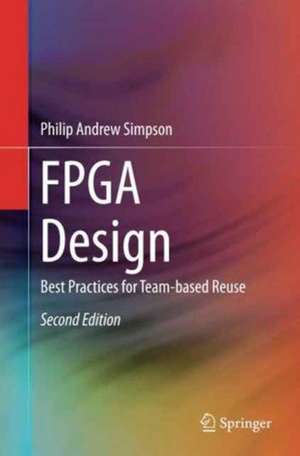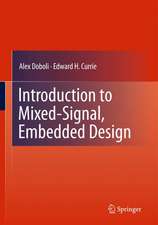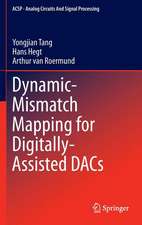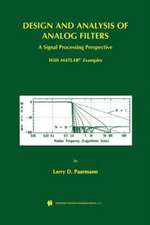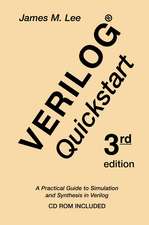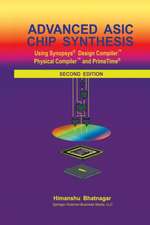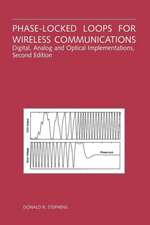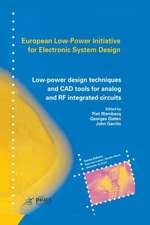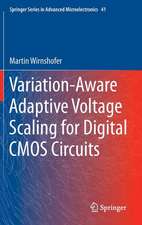FPGA Design: Best Practices for Team-based Reuse
Autor Philip Andrew Simpsonen Limba Engleză Paperback – 13 oct 2016
This book’s content has a strong focus on design teams that are spread across sites. The goal being to increase the productivity of FPGA design teams by establishing a common methodology across design teams; enabling the exchange of design blocks across teams.
Coverage includes the complete FPGA design flow, from the basics to advanced techniques. This new edition has been enhanced to include new sections on System modeling, embedded design and high level design. The original sections on Design Environment, RTL design and timing closure have all been expanded to include more up to date techniques as well as providing more extensive scripts and RTL code that can be reused by readers.
- Presents complete, field-tested methodology for FPGA design, focused on reuse across design teams;
- Offers best practices for FPGA timing closure, in-system debug, and board design;
- Details techniques to resolve common pitfalls in designing with FPGAs.
| Toate formatele și edițiile | Preț | Express |
|---|---|---|
| Paperback (1) | 574.05 lei 38-44 zile | |
| Springer International Publishing – 13 oct 2016 | 574.05 lei 38-44 zile | |
| Hardback (1) | 949.42 lei 6-8 săpt. | |
| Springer International Publishing – 2 iun 2015 | 949.42 lei 6-8 săpt. |
Preț: 574.05 lei
Preț vechi: 745.51 lei
-23% Nou
Puncte Express: 861
Preț estimativ în valută:
109.86€ • 113.49$ • 91.43£
109.86€ • 113.49$ • 91.43£
Carte tipărită la comandă
Livrare economică 21-27 martie
Preluare comenzi: 021 569.72.76
Specificații
ISBN-13: 9783319342481
ISBN-10: 3319342487
Pagini: 268
Ilustrații: XI, 257 p. 129 illus., 85 illus. in color.
Dimensiuni: 155 x 235 mm
Ediția:Softcover reprint of the original 2nd ed. 2015
Editura: Springer International Publishing
Colecția Springer
Locul publicării:Cham, Switzerland
ISBN-10: 3319342487
Pagini: 268
Ilustrații: XI, 257 p. 129 illus., 85 illus. in color.
Dimensiuni: 155 x 235 mm
Ediția:Softcover reprint of the original 2nd ed. 2015
Editura: Springer International Publishing
Colecția Springer
Locul publicării:Cham, Switzerland
Cuprins
Introduction.- Project Management.- Design Specification.- System Modeling.- Resource Scoping.- Design Environment.- Board Design.- Power and Thermal analysis.- Team Based Design.- RTL Design.- IP reuse.- Embedded Design.- Functional verification.- Timing Closure.- High level Design.- In System Debug.- Design Sign-off.
Notă biografică
Phil Simpson is Altera’s senior manager for software technical marketing and product planning. In this role, Simpson is responsible for Altera’s Quartus II software and third-party EDA interfaces product planning and the creation of the Altera design flow software roadmap. Prior to joining Altera in 1996, Simpson held several engineering roles at various EDA and semiconductor companies, including EDA Solutions, Data I/O and Lucas Aerospace. Simpson holds a BS (with honors) in Electrical & Electronic Engineering from City University, London and an MSC (with distinction) in system design from the University of Central England, Birmingham, England.
Textul de pe ultima copertă
This book describes best practices for successful FPGA design. It is the result of the author’s meetings with hundreds of customers on the challenges facing each of their FPGA design teams. By gaining an understanding into their design environments, processes, what works and what does not work, key areas of concern in implementing system designs have been identified and a recommended design methodology to overcome these challenges has been developed.
This book’s content has a strong focus on design teams that are spread across sites. The goal being to increase the productivity of FPGA design teams by establishing a common methodology across design teams; enabling the exchange of design blocks across teams.
Coverage includes the complete FPGA design flow, from the basics to advanced techniques. This new edition has been enhanced to include new sections on System modeling, embedded design and high level design. The original sections on Design Environment, RTL design and timing closure have all been expanded to include more up to date techniques as well as providing more extensive scripts and RTL code that can be reused by readers.
This book’s content has a strong focus on design teams that are spread across sites. The goal being to increase the productivity of FPGA design teams by establishing a common methodology across design teams; enabling the exchange of design blocks across teams.
Coverage includes the complete FPGA design flow, from the basics to advanced techniques. This new edition has been enhanced to include new sections on System modeling, embedded design and high level design. The original sections on Design Environment, RTL design and timing closure have all been expanded to include more up to date techniques as well as providing more extensive scripts and RTL code that can be reused by readers.
- Presents complete, field-tested methodology for FPGA design, focused on reuse across design teams;
- Offers best practices for FPGA timing closure, in-system debug, and board design;
- Details techniques to resolve common pitfalls in designing with FPGAs.
Caracteristici
Presents complete, field-tested methodology for FPGA design, focused on reuse across design teams Offers best practices for FPGA timing closure, in-system debug and board design Details techniques to resolve common pitfalls in designing with FPGAs
